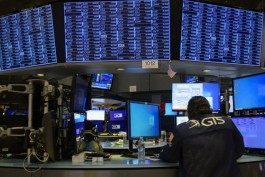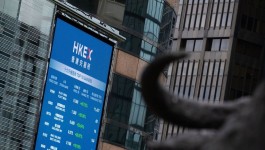Asian stocks fell on Wednesday ahead of an important inflation report as investor confidence deteriorated due to the debt ceiling crisis in the United States.
A benchmark index of stock movement in Asia fell by 0.5%, putting it on track for its biggest loss in more than two weeks.
Futures on the S&P 500 and Nasdaq 100 rose very slightly in Asia after the two indices fell by 0.5% and 0.7% respectively on Tuesday.
US stock index is trading in a narrow trading range as investors weigh a potential Federal Reserve halt in interest rate hikes against a possible slowing economy.
The same process is happening in global equities, which have veered largely sideways for more than a month, according to the MSCI World Index of Global Equities.
The dollar fell slightly against all of its G10 counterparts. The Australian currency made a small advance after falling 0.3% on Tuesday, when the government announced a budget surplus that may help moderate inflation. Bond yields rose in Australia.
debt ceiling crisis
Treasury yields stabilized after a weak reaction in the futures market after President Joe Biden and Republicans in Congress made little tangible progress towards averting the first debt default in the United States. They pledged spending negotiations that would open the door to a potential deal, and Biden and House Speaker Kevin McCarthy will meet again on Friday.
I don't think there's likely to be any market reaction until we get closer to date X - which is still a moving target, probably in June and possibly later in the year, said Jason Wong, currency strategist at Bank of New Zealand. July. Meanwhile, the headlines around the negotiations are more of a noise than a signal, and most of them are neutral to market action.
While the impact of the debt ceiling negotiations was relatively muted on Wednesday, it casts a long shadow over the markets. Some of Wall Street's most seasoned investors have warned of unimaginable long-term damage if the US defaults.
Yields on Treasury bills due in early June drove up prices for short-term securities, as both Biden and McCarthy disavowed a short-term extension of the debt ceiling. The Treasury Department has also reduced the size of auctions for the four- and eight-week notes, as it reduces the sale of these types of securities amid the debt ceiling crisis.
Inflation in America and China
Another source of concern for the markets is the US inflation report due later on Wednesday. The report is expected to show that the headline consumer price index rose 5% in April year on year, indicating that price pressures remain uncomfortably high for the Fed. This will be followed on Thursday by China's consumer and producer price data, which is expected to show easing inflation pressures in the bustling Asian manufacturing hub.
US central bank officials, including New York Fed President John Williams, are watching for signs of a credit crunch. Williams said in an interview on Tuesday that he did not include a rate cut in his forecast for this year. It left open the possibility that the Federal Reserve would stop raising interest rates temporarily. The swaps linked to the dates of monetary policy meetings indicate that dealers expect a cut of at least 50 basis points by the end of 2023.
Goldman and Barclays: US interest will not decrease as much as expected in 2023
However, some investors are not about to change their investment strategies based on this week's developments.
Another inflation report and payroll numbers will be released before the next Fed rate decision in mid-June, Chetan Seth, equity strategist at Nomura Holdings, noted on Bloomberg TV. He said: I do not think there is a temptation to stretch our necks and say that this will change the picture in fact.
On the other hand in the markets, oil retained most of the recent increase in its prices after the Biden administration announced plans to refill the strategic reserve. Gold prices fluctuated while Bitcoin continued to trade below $28,000.






































